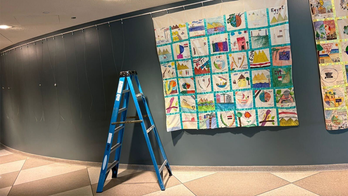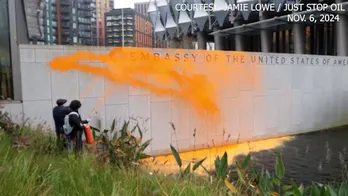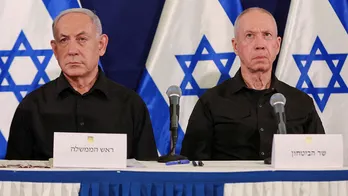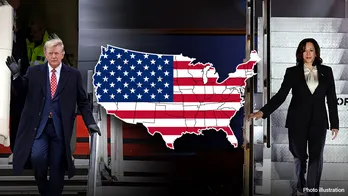Another hostages-for-prisoners swap expected if a fragile cease-fire holds in Israel
TEL AVIV, Israel — Families in Israel with loved ones still held by Hamas were hopeful that a third hostages-for-prisoners swap on Sunday would go ahead as planned after the Palestinian Islamist militant group nearly backed out of the previous day's exchange.
The latest trade of captives — the next-to-last under the original four-day cease-fire deal between the two sides — comes amid signs of rising violence in the Israeli-occupied West Bank, where Israeli forces killed five people in an operation overnight at a refugee camp there. Three others were killed elsewhere in the territory, according to the Palestinian health ministry.
On Saturday, the second exchange of captives came close to unraveling over what Hamas said were Israeli violations of terms of the truce that has briefly halted the fighting in Gaza. Israel denies such violations.
Hours after 13 Israelis and four Thais were to have been freed, Egyptian and Qatari officials announced that the swap was back on track. After their release, Israel freed 39 Palestinian prisoners. On the first day of the pause in fighting on Friday, 13 Israelis were exchanged for 39 Palestinians in Israeli jails. Eleven foreign laborers, 10 Thais and a Filipino, were also set free.
The hostages are just some of the about 240 people seized during Hamas' Oct. 7 attack that killed 1,200 people. In response, Israel launched a massive campaign of airstrikes and ground assaults on Gaza that has killed at least 13,300 Palestinians, according to the Gaza Health Ministry.
Three Americans — two women and a 4-year-old girl whose parents were killed in last month's attacks — are among those held by Hamas. Speaking on NBC's Meet the Press on Sunday, National Security Adviser Jake Sullivan said White House officials "have reason to believe that one of those Americans will be released today."
"But until we see her out safely from Gaza, in the hand of authorities and ultimately in the hands of her family, then we won't be certain," he said.
Among the captives freed on Sunday was 9-year-old Emily Hand. Her father, Thomas Hand, had been informed she was killed in the attack only to be told later that her body was not found among the victims.
"We can't find the words to describe our emotions after 50 challenging and complicated days," Thomas Hand said in a statement to the Hostages and Missing Families Forum.
In Gaza, which has been pounded for nearly seven weeks by a relentless Israeli bombardment before the temporary truce went into effect, humanitarian groups were rushing aid to civilians while the situation on the ground was still relatively quiet.
Israeli military officials issued a warning on Sunday to civilian Palestinians inside Gaza, ordering them to remain in the south and not to travel within a half-mile of the border with Israel.
Meanwhile, the Palestinian Health Ministry reported at least eight Palestinian civilians killed by Israeli soldiers over the last 24 hours in the Israeli-occupied West Bank, according to The Associated Press.
"It's good that we have a truce in Gaza, but there is no truce in the West Bank," said Basil Abu Nasr a shopkeeper in the Qalandiya refugee camp near Ramallah. "They still raid our villages, they still raid our refugee camps...make arrests and attack people."
Aman Naf'a, whose husband has been jailed by the Israelis, told NPR that violence by the Israeli military and settlers angers many of her Palestinian neighbors.
"We want the whole world to see what they are doing to us," Naf'a told NPR.
The Israeli military said its soldiers killed five Palestinians in a gun battle in the Jenin refugee camp and arrested a Palestinian suspected of killing an Israeli father and son earlier this year.
In an appearance on the social media site X, formerly Twitter, on Saturday, Israel Defense Forces Maj. Doron Spielman said the IDF was trying to limit threats to Israeli civilians after Hamas's deadly attack.
"We are focused on Gaza but this has been a multi-front war over the last five weeks," Spielman said. He also pointed to threats from Hezbollah, an anti-Israel militia backed by Iran operating in southern Lebanon.
Israeli officials have said they plan to resume their full-scale offensive against Hamas in Gaza once the temporary truce ends.
In a statement early Sunday, United Nations officials said they hoped the cease-fire would be extended. "The longer the pause lasts, the more aid humanitarian agencies will be able to send in and across Gaza," the U.N. statement said.
The U.N. Office for the Coordination of Humanitarian Affairs (OCHA) said 200 trucks loaded with aid were dispatched on Saturday and that 187 had entered Gaza by 7 p.m. local time (noon EDT). The bulk of the aid went to areas in the south, it said.
OCHA says that 1.7 million people in Gaza, or nearly 80% of its 2.2 million people, are internally displaced and that nearly 900,000 of them were sheltering in some 100 facilities in the south.
Under the original terms of the truce, a swap of captives on Monday would be the last. But Israel said it's willing to extend the deal for up to 10 days if Hamas continues releasing hostages.
Citing an unnamed official Egyptian source, Al Qahera News said Egypt, Qatar and the United States, which played key roles in brokering the temporary truce, were making efforts to prolong the cease-fire.
NPR's Brian Mann reported from Ramallah in the West Bank. NPR's Scott Neuman contributed from Tel Aviv.
Disclaimer: The copyright of this article belongs to the original author. Reposting this article is solely for the purpose of information dissemination and does not constitute any investment advice. If there is any infringement, please contact us immediately. We will make corrections or deletions as necessary. Thank you.







